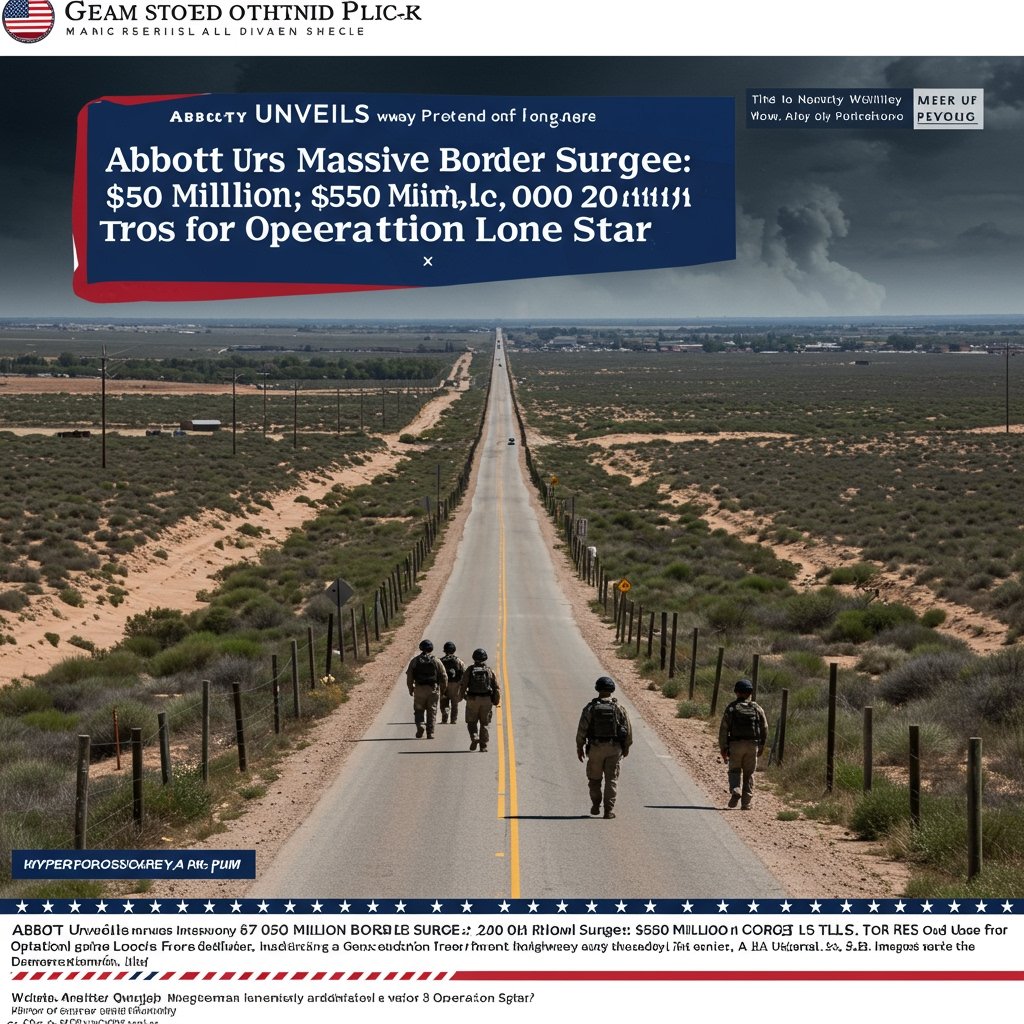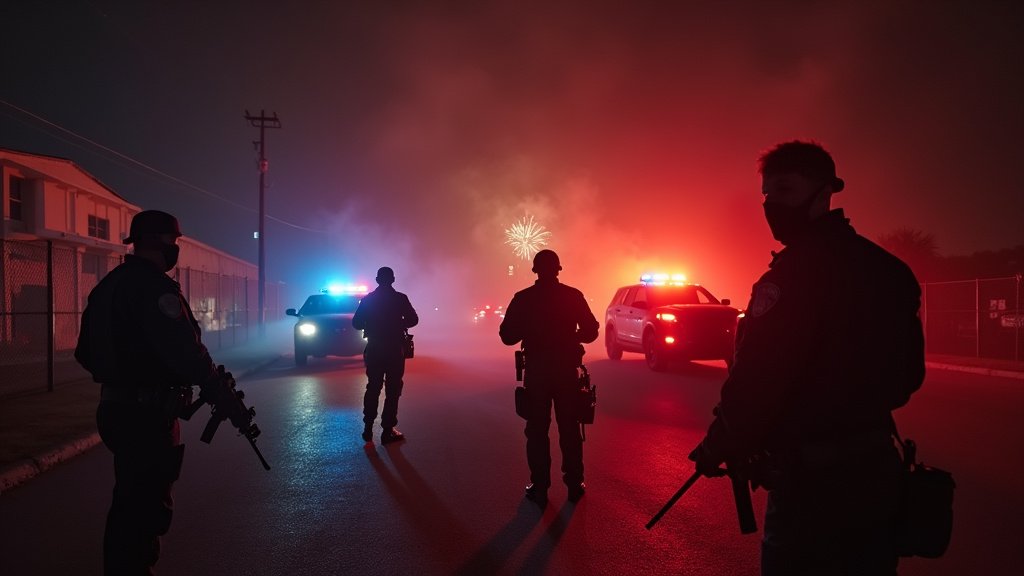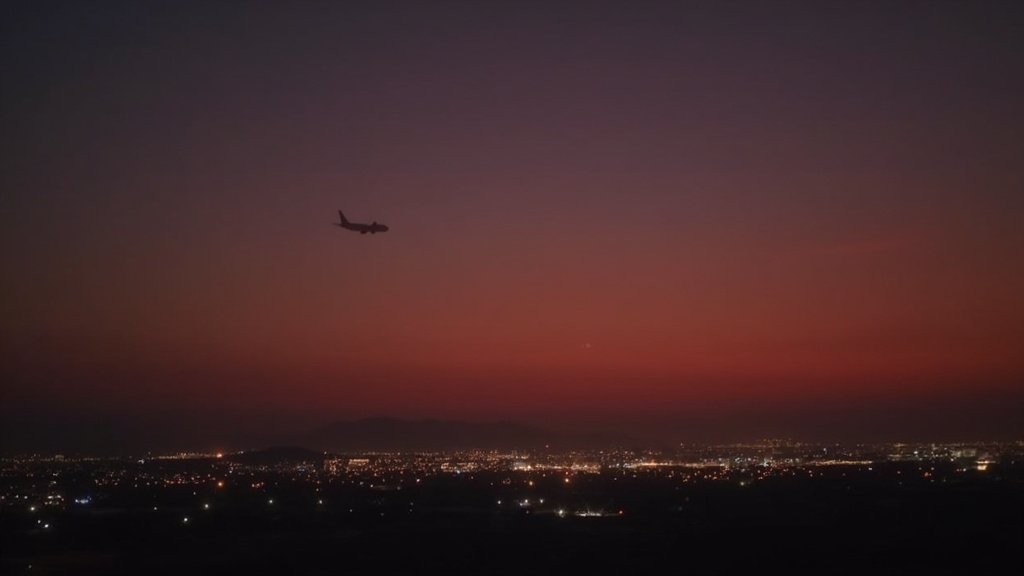Texas Governor Announces Major Escalation in Border Security Operation
Governor Greg Abbott today announced a significant escalation in Texas’ ongoing border security initiative, Operation Lone Star. Speaking at a press conference held near Shelby Park in Eagle Pass, a key flashpoint in state-federal border disputes, the governor unveiled a commitment of an additional $500 million in state funds specifically earmarked to enhance border security efforts along the state’s lengthy border with Mexico, particularly focusing on the Rio Grande.
This substantial financial injection is slated to bolster various aspects of the state’s operations. According to statements from state officials at the announcement, the $500 million will support critical components designed to increase the effectiveness and reach of Operation Lone Star. Key among these are the funding of rapid-response teams capable of quickly deploying to areas experiencing high levels of illegal crossings or cartel activity. The funds will also facilitate increased technology deployment, which could include a range of surveillance tools such as drones, cameras, and sensor systems aimed at detecting and tracking border crossings.
Furthermore, a portion of the allocated funds will be dedicated to the construction of temporary barriers on state land. This strategy, which has included concertina wire and other fencing materials in the past, aims to impede physical access across certain sections of the border deemed high-traffic areas for illegal entry. The emphasis on state land underscores Texas’ assertion of its authority to manage border security within its territory, often citing perceived inaction or insufficient measures from the federal government.
Personnel Expansion: 2,000 More Troops Deployed
In conjunction with the financial commitment, Governor Abbott announced a significant increase in personnel dedicated to Operation Lone Star. The plan includes deploying an additional 2,000 Texas National Guard troops to key sectors along the border. Specific mention was made of areas such as Eagle Pass and Del Rio, regions that have frequently been at the forefront of migrant surges and state-federal confrontations regarding border enforcement roles and responsibilities.
This deployment brings the total number of state personnel involved in Operation Lone Star to over 8,000. This figure encompasses not only Texas National Guard members but also personnel from the Texas Department of Public Safety (DPS) and other state agencies involved in the multifaceted operation. The expanded troop presence is intended to increase the operational tempo, extend the physical reach of state authorities along the border, and provide a more visible deterrent presence.
The stated primary aims of this escalation, as articulated by Governor Abbott and state officials, are twofold: to deter illegal immigration and to disrupt the activities of criminal cartels operating across the border. State officials argue that increased personnel and resources are necessary to combat the flow of illegal crossings, drug smuggling, and human trafficking, which they attribute to the cartels. The rapid-response teams, enhanced technology, and physical barriers are all presented as tools to achieve these objectives by making illegal entry more difficult and increasing the likelihood of interdiction.
Operation Lone Star: Context and Rationale
Operation Lone Star was launched in March 2021 as a joint effort between the Texas Department of Public Safety and the Texas Military Department. Its initial stated goals were to deter illegal border crossings and combat the smuggling of drugs and people into Texas. Since its inception, the operation has involved deploying thousands of state personnel, constructing state-sponsored border barriers, and implementing state-level enforcement measures, including arresting migrants on state criminal charges such as trespassing.
The state of Texas has consistently justified Operation Lone Star by citing what it describes as a failure by the federal government to secure the border adequately. State officials contend that the influx of migrants and illicit substances poses a direct threat to the safety and security of Texas residents, necessitating aggressive state intervention. The operation has drawn considerable state funding since 2021, with previous legislative sessions allocating billions of dollars to the effort. This additional $500 million represents a significant new investment, signaling the state’s continued commitment to its independent border security strategy despite ongoing legal and political challenges.
Governor Abbott’s announcement at Shelby Park was particularly symbolic. This location in Eagle Pass has been central to recent disputes, including the state’s assertion of control over the park and its denial of access to U.S. Border Patrol agents, an action that led to a Supreme Court case and subsequent legal and political maneuvering. Holding the press conference there underscored the state’s resolve and its willingness to operate independently of, and at times in conflict with, federal border authorities.
Immediate Reactions and Future Implications
The announcement of this escalation drew immediate and varied reactions. Federal officials, while not issuing an immediate unified statement, have historically emphasized the federal government’s primary authority over immigration and border enforcement, often viewing state efforts like Operation Lone Star as potentially counterproductive, duplicative, or infringing upon federal roles. Reactions from Washington are anticipated to reiterate the Biden administration’s stance on border management and the division of responsibilities between state and federal governments.
Civil rights groups also reacted swiftly, expressing significant concerns regarding the expansion of Operation Lone Star. These groups have consistently raised issues surrounding the operation’s impact on civil liberties, humanitarian concerns for migrants, potential for racial profiling, and the legality of state actions like arresting migrants on trespassing charges. Concerns are likely to intensify regarding the increased militarization of the border region, the potential for human rights violations, and impediments to accessing asylum or legal processes. Advocacy organizations are expected to scrutinize the use of the additional funds and the conduct of the expanded state forces.
The financial implications of Operation Lone Star continue to mount for Texas taxpayers, with this $500 million bringing the total state investment into the billions. The effectiveness of the operation in achieving its stated goals of deterring illegal immigration and disrupting cartels remains a subject of intense debate, with varying metrics and interpretations offered by state officials and critics alike. The expansion signals that Texas intends to continue its assertive and costly border security strategy, likely prolonging the political and legal battles with the federal government and keeping border policy at the forefront of national attention.
This latest move by Governor Abbott underscores the persistent tensions over border control policy and the differing approaches taken by the state of Texas and the federal government. The commitment of substantial funds and personnel represents a significant step in Texas’ independent efforts, promising further developments and continued scrutiny of Operation Lone Star’s impact and outcomes.






